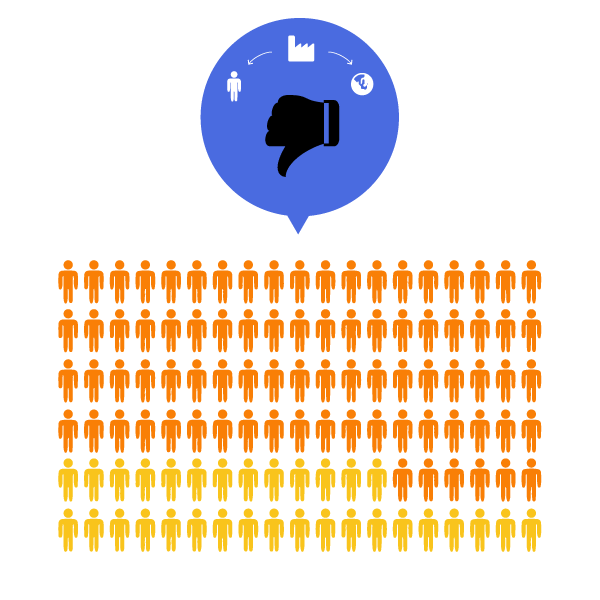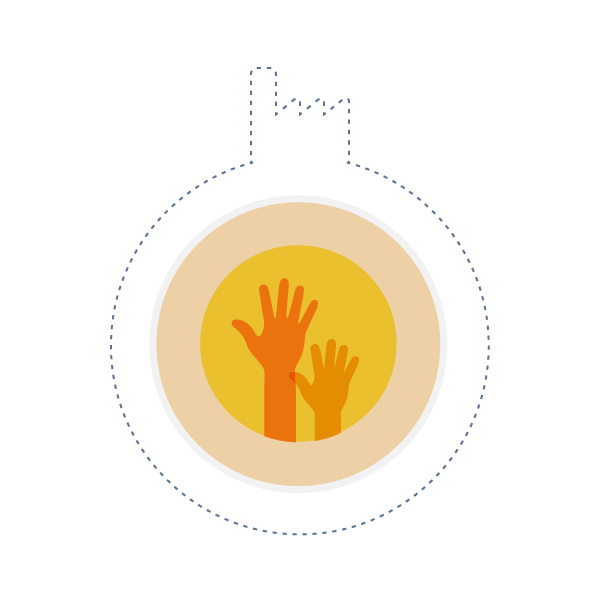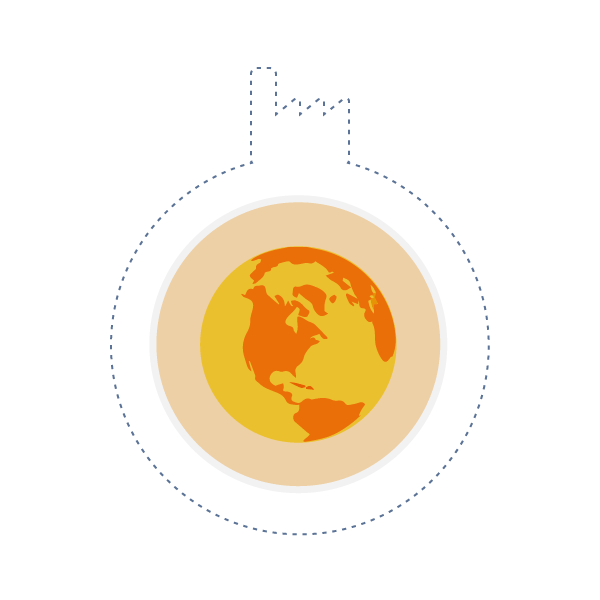Consumers don't want to make the world a better place.
They want brands to do that for them ;)
Okay, that’s a simplification of a complex issue.
But when it comes to making the world a better place, many consumers are setting a more stringent standard for brands than they are for themselves.
And let’s face it, given decades of unethical operations, rampant pollution, disinformation and more, brands deserve it. After all, many brands have worked extremely hard to create many of the behaviors and lifestyle choices that well-meaning consumers are now finding so hard to change.

In a global survey of 30,000 consumers, 72% of people said that business is failing to take care of the planet and society as a whole.
Accenture & Havas Media, June 2014
What are you prepared to SACRIFICE?
The powerful question consumers will be asking brands in 2015.
The situation now? Endless brand sustainability initiatives and CSR-speak; endless consumer skepticism.
The only meaningful path left for brands is to stop talking and act. One powerful form of action that will rise to the top of the consumer agenda in 2015? Real, constructive, painful SACRIFICES.
Because the message from many of these consumers will be ‘do as I say, not as I do’.
Sounds unfair? Who said consumers had to be fair?
Still, if you take some time to understand the epic force driving this trend, you’ll understand why consumers are acting this way…
In the pursuit of the nirvana that is GUILT-FREE CONSUMPTION, consumers are looking for brands to make SACRIFICES (so they don’t have to).
SACRIFICES aren't easy.
In fact, they're downright painful!
We know plenty of consumers agree that it would be good for the planet if we all flew a little less. But how many consumers are really stopping flying? (How many flights have you SACRIFICED this year? ;)
The US Department of Transportation reported domestic routes were 87.4% full in June 2014 – a new monthly record, while the IATA reported global passenger demand had increased 5.9% in the year to date vs. the comparable period in 2013.
Because while some consumers are actively making SACRIFICES of their own, many more crave a new kind of consumption: one that allows continued indulgence without guilt over negative impacts on SELF, SOCIETY or the PLANET.
The easiest and most desirable way for consumers to assuage (or obliterate!) their guilt?
For brands to make visible, meaningful and constructive SACRIFICES: of products, processes, attention and opportunities.
SACRIFICING for the SELF
See how these brands and businesses are SACRIFICING to reduce negative impacts on consumer wellbeing.

CVS
US drugstore chain stops selling tobacco products
As of September 2014, US drugstore chain CVS pulled cigarettes and tobacco-related products from all its stores. Predicting that the decision will cost around USD 2 billion in annual revenue, the chain states that stocking tobacco products is in conflict with its role as a healthcare company. The company also launched the quit smoking campaign #OneGoodReason on social media, and rebranded its corporate entity as CVS Health.
Tesco
UK supermarket removes checkout candy
In May 2014, Tesco announced that it would remove candy from its checkouts by the end of December 2014. The policy will apply to all of its stores, and aims to help customers choose more healthy options. The UK supermarket’s research showed that 65% of shoppers felt that moving candy to elsewhere with the store would encourage them to be more healthy.
Subway
Sandwich chain removes potentially harmful chemical from its bread in the US
In February 2014, Subway announced that it would remove the chemical azodicarbonamide from its bread products in the US, after a consumer petition raised over 60,000 signatures in a week. The chemical – which lengthens the shelf life of bread – is approved by the USDA and FDA, however is not allowed to be used in food products in Europe or Australia. Advocacy groups claimed that the chemical converted into carcinogens when baked.
SACRIFICING for SOCIETY
See how these brands are making sacrifices to reduce negative impacts on society.

Intel
Chip maker stops using minerals from conflict zones
In January 2014, multinational technology firm Intel stopped using materials from conflict zones to build its microprocessors. Minerals such as gold and tungsten are often mined in countries affected by armed struggles and human rights violations, such as the Democratic Republic of Congo. Intel has urged others in the technology industry to follow its lead by sourcing materials from conflict-free locations.
Guinness
Drinks brand pulls out of NY's St. Patrick's Day parade over LGBT participation exclusion
In March 2014, Irish brewer Guinness announced it would not participate in New York City’s annual St. Patrick’s Day Parade because gay and lesbian groups were prohibited from carrying gay-friendly or LGBT identifying signs. The brand, one of the event’s biggest sponsors, withdrew support the day before the event after negotiations to reverse the exclusion policy failed. In September 2014, event organizers announced that an LGBT group would be allowed to march under their own banner in the 2015 parade.
Apple
CEO claims that consumer privacy is protected because company profits from device sales rather than advertising
A self-claimed BRAND SACRIFICE ;) Following public controversy over purported customer data security breaches, in September 2014 Tim Cook, Apple’s CEO published an open letter to customers outlining the company’s commitment to privacy. In the letter he stated: “Our business model is very straightforward: We sell great products. We don’t build a profile based on your email content or web browsing habits to sell to advertisers. We don’t ‘monetize’ the information you store on your iPhone or in iCloud. And we don’t read your email or your messages to get information to market to you.” The letter was widely interpreted to be a challenge to competitor Google, which derives much of its revenue from advertising based on consumer data.
SACRIFICING FOR THE PLANET
See how these brands are making SACRIFICES to reduce negative impacts on the planet.

Tesla
US electric car manufacturer won't enforce its patents
In June 2014, Tesla announced that it would no longer initiate patent lawsuits against anyone using their technology in good faith. The company stated that given the incredibly small size of the electric car market relative to the total automotive market, and the urgency of the carbon crisis, there would be an overall benefit to humanity in making their technology available (even to potential competitors).
STA Travel
UK travel company says no to the unethical treatment of animals
In May 2014, UK-based student travel agency STA Travel announced that it would stop selling trips to destinations associated with the ‘unethical’ treatment of animals. The ban initially included all SeaWorld theme parks and elephant tours at the Tiger Temple in Thailand. It was implemented following advice from People for the Ethical Treatment of Animals (PETA). STA Travel also committed to a wider strategy to promote responsible tourism around the world.
H&M, Forever 21, Topshop, ASOS & more
Fashion retailers stop selling angora wool products
Following allegations that suppliers in China were mistreating rabbits during the production of angora wool in November 2013, multiple global fashion retailers have removed angora products from stock and suspended sourcing. More than 30 brands, including H&M, Forever 21 and Topshop (who received a petition with more than 100,000 signatures), committed to removing angora products, with ASOS, Mango and John Lewis implementing permanent bans in the UK. Other retailers, including Tommy Hilfiger and Calvin Klein, committed to global bans. The original video footage was released by animal-rights organization PETA and was widely circulated on social media.








